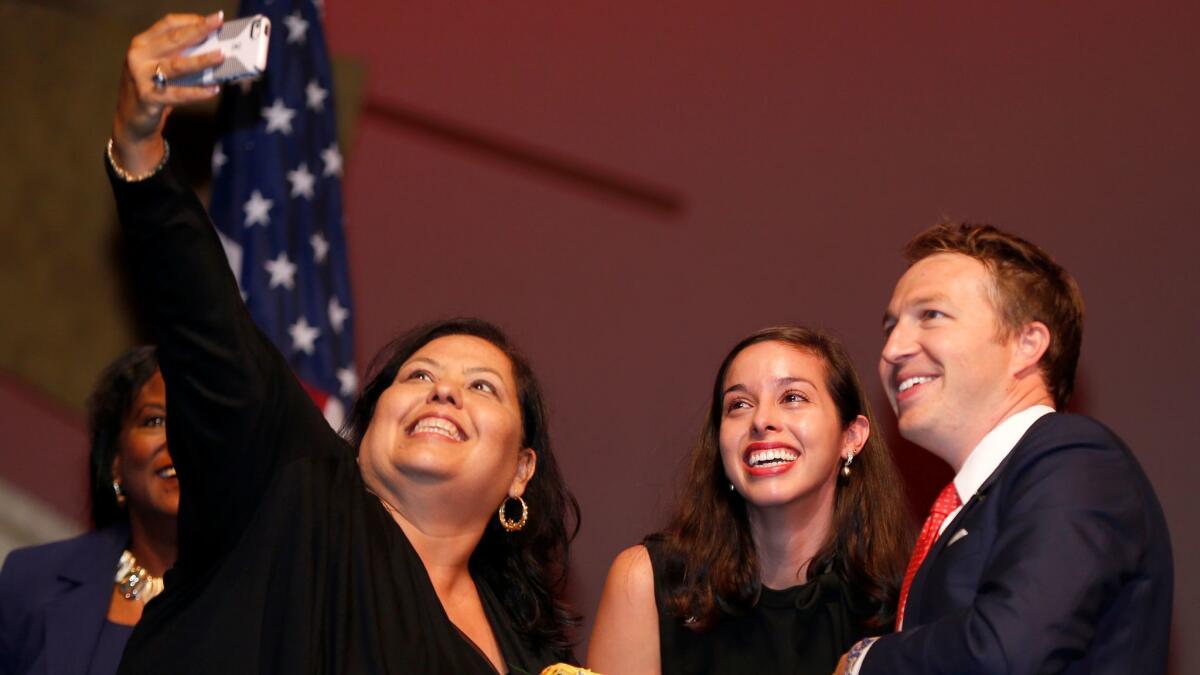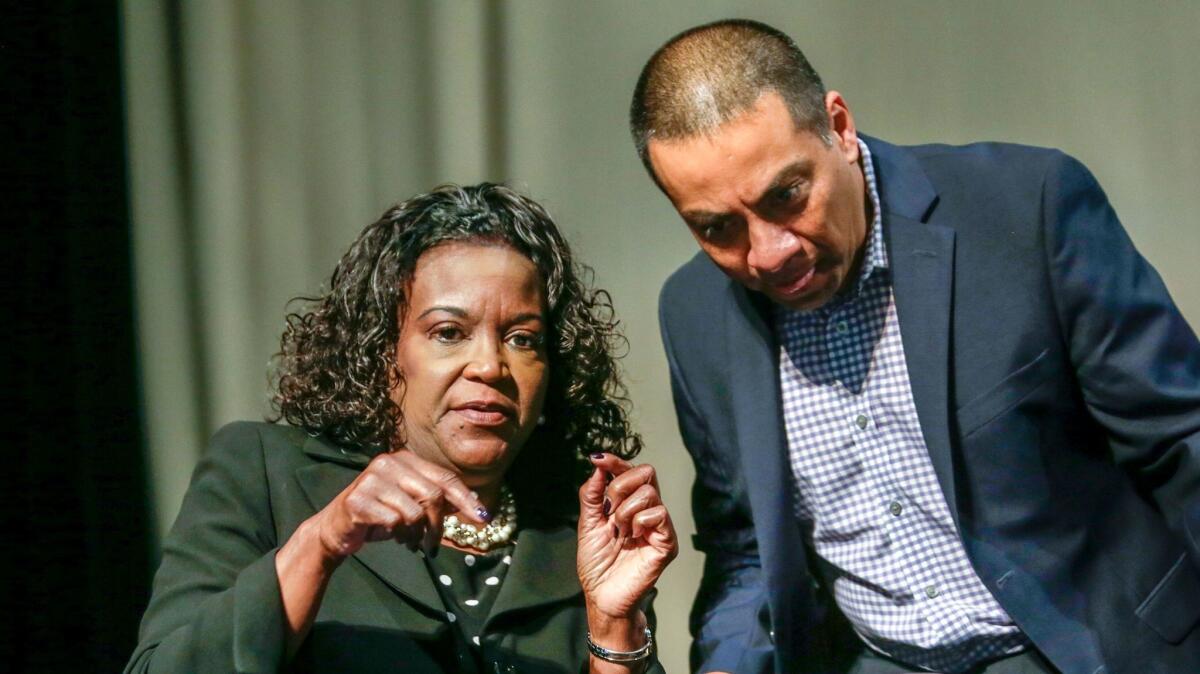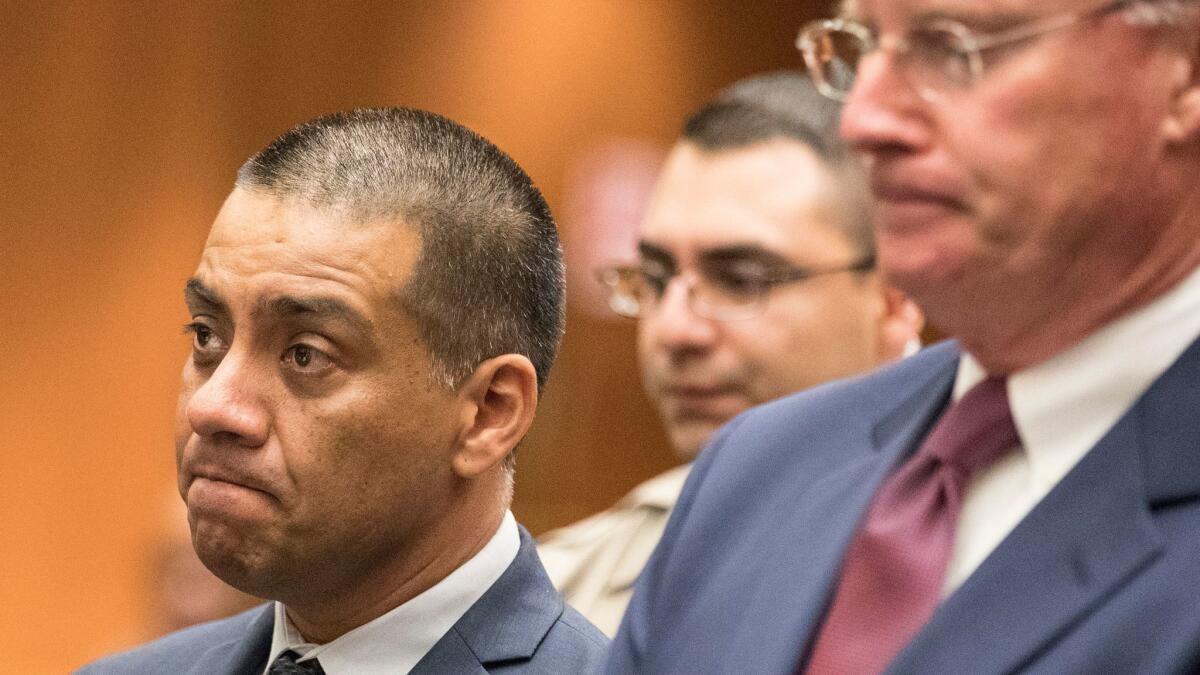Q&A: With Rodriguez’s legal troubles, L.A.’s school board faces some tough choices

- Share via
The leaders of the Los Angeles Unified School District have some tough decisions ahead, now that Ref Rodriguez, who is facing felony charges, has stepped down as school board president.
Board members are likely to choose a new president from among their ranks on Tuesday, when the seven-member body is scheduled to consider the matter.
Rodriguez, 46, who did not surrender his seat on the board, faces three felony charges and 25 misdemeanor counts in what the Los Angeles Ethics Commission described as campaign money laundering. Prosecutors allege that he funneled his own money into his successful bid for office in 2015 by reimbursing straw donors. He has not commented on the charges and is scheduled to enter a plea on Oct. 24.
It’s not yet clear how deeply his problems will effect the power dynamic on the Board of Education, although they have proved a major distraction. Rodriguez is part of a four-member majority elected with record spending by charter-school supporters. The other three board members benefited from heavy spending by the teachers union.
What will the Board of Education do to replace Rodriguez as board president?
The school board has scheduled a vote Tuesday to select a new president. Rodriguez is expected to be among the seven members casting ballots in open session. That will give the the four-vote bloc that selected him control over his successor.
If Rodriguez opted not to vote, which seems unlikely, or resigned entirely from the board, then six board members would vote on a new president and a 3-3 split leading to a deadlock would not be surprising.
If the board deadlocked over a successor, then vice president Monica Garcia would serve as acting board president. The board could vote on the position again at a subsequent meeting.
Why didn't school board president Ref Rodriguez just write himself a big check? »
Who is likely to become the next board president?
The longest serving board member, Monica Garcia, would be an obvious choice, especially because she has served as board president before and belongs to the four-member majority bloc.
She announced Friday that she is giving up her full-time job with L.A. County, a decision made easier by the recent increase in full-time board member pay from $45,637 a year to $125,000.
“I am open and willing to do what I can to serve the board and our district,” she said in a statement, while confirmed that she’d accept the role of board president.
At times, Garcia has been a polarizing presence, which is one reason why the board coalesced around the congenial Rodriguez.
Another option would be Richard Vladovic, also a past board president. He had three votes in July and has been consistently endorsed by both the teachers unions and charter-school advocates — the main opposing political forces in L.A. Unified.
The other alternatives from the majority bloc are Nick Melvoin, 32, or Kelly Gonez, 29, who both joined the board in July. It is rare for a newcomer to be selected. The last time it happened was in 1999 when the board chose Genethia Hayes, who had leadership experience as a longtime community activist.
Another possibility to replace Rodriguez as president could be George McKenna, who has decades of experience in education, including as superintendent in Inglewood, and is known for his political independence.
I am open and willing to do what I can to serve the board and our district.
— Board member Monica Garcia
Does it matter who serves as board president?
Some observers contend it doesn’t much, because the president has one vote, just like any other board member. But some presidents, including Garcia, have used the position to leverage influence on key decisions. Recent school board president Steve Zimmer, who lost his bid for reelection to Melvoin, became a prominent spokesman and lobbyist for the nation’s second-largest school system.
The president also has actual duties. He or she sets the meeting schedule, determines who sits on board committees and decides which committees exist. Rodriguez chose Garcia as his vice president, which is why she is acting president until a new leader is selected.

Rodriguez only became president in July, but he generally received good marks for moving things along and courteously but firmly encouraging his colleagues to wind up their speeches. He also replaced regular reports from labor union officials with reports from students.
The board president has a budget $50,000 larger than other members, on the theory that representing the whole school district could involve travel and other extra expenses.
L.A. teachers union calls for Rodriguez to resign »
Is there a chance that Rodriguez would resign?
Yes. He may decide he needs to focus on his defense. He could also, some observers note, negotiate a plea bargain that would include reduced charges but a condition that he leave office.
The teachers union, United Teachers Los Angeles, has called for his resignation. He may also feel pressure more privately from his allies, who might conclude that he has become a political liability.
What happens if Rodriguez gives up his seat?
If he were to do so before a new president was chosen, his bloc would lack the votes to choose a successor to run the board. Barring a compromise choice, a deadlock would leave Garcia in charge.
More broadly speaking, Rodriguez’s departure would leave board members with three choices:
- Call a special election to fill the seat until the next regular election in 2020.
- Appoint a replacement to fill the seat until the next regular election.
- Appoint a replacement until a special election can be held to fill the seat for the remainder of the term.
Rodriguez was elected in 2015, with an extra-long term of five and a half years designed to sync future municipal elections with state and national voting.

How do the charges against Rodriguez affect the political dynamic on and surrounding the board?
The new board majority came in as the first to be elected with overwhelming financial support from charter-school advocates. Charters are operated under their own boards, separate from L.A. Unified, and their rapid growth has been controversial. The new majority has been widely expected to spur charter expansion, change how the district oversees charters and give charter schools improved access to classroom space on district campuses.
Right away, the new majority members branded their efforts “Kids First” in a resolution introduced by Rodriguez. His problems could tarnish this branding if he sticks around. If he doesn’t, his departure could stall the agenda favored by the majority and its backers.
Sign up for Essential California
The most important California stories and recommendations in your inbox every morning.
You may occasionally receive promotional content from the Los Angeles Times.








